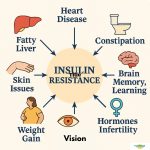In a world that often glorifies quick fixes and rapid results, it’s easy to feel pressured into extreme diets that promise fast weight loss. But behind the allure of “crash” approaches lies a more profound truth: true healing is not about urgency, it’s about nourishment, consistency, and trust. This article explores why crash diets often backfire, how they affect both the body and mind, and what it really takes to support sustainable weight loss and lasting well-being.

Crash diets, while promising rapid results, often fail to deliver sustainable health benefits. The temptation to shed pounds quickly, especially when motivated by an upcoming event or a desire to take control of one’s health, can be intense. However, the long-term consequences of extreme dieting can lead to setbacks that undermine both physical and emotional well-being. It's essential to be aware of these risks when considering a weight loss plan.
Even when some weight is lost initially, the rebound effect, weight regain, fatigue, and metabolic disruption are nearly inevitable. Lasting weight loss doesn't come from quick fixes. It comes from consistent, informed lifestyle changes that prioritize health over haste.
The Science Behind Crash Diet Failure
Drastically reducing calorie intake throws the body into a state of perceived starvation. In response, metabolism slows down, and the body becomes more efficient at storing fat. This biological survival mechanism, while applicable in ancient times, works against modern dieters.
A study from the American Journal of Clinical Nutrition found that people who followed very low-calorie diets experienced a significant reduction in resting metabolic rate, up to 25% lower than expected based on weight loss alone. This means that even eating a normal amount of food afterward can lead to rapid weight regain.
How Crash Diets Sabotage Mental Health
Rapid dieting doesn’t just affect the body; it wreaks havoc on mental and emotional well-being. Mood swings, irritability, and obsessive thoughts about food are common. A restricted diet can even increase cortisol, the body’s stress hormone, which may encourage fat storage, particularly around the abdomen.
Furthermore, constantly cycling between extreme restriction and bingeing can erode self-trust. This pattern fosters a negative relationship with food, turning meals into a source of guilt rather than nourishment. Confidence takes a hit, too, when weight is regained and the sense of “failure” sets in.

Turning to Medication as a Shortcut
Some individuals, frustrated with failed attempts at traditional dieting, seek pharmaceutical interventions. Among them is the increasingly popular Ozempic weight loss drug, originally developed to manage type 2 diabetes. This medication helps reduce appetite by affecting hormone levels related to hunger.
Although early studies have shown promising results for weight loss, it's not a substitute for lifestyle changes. Users often experience side effects, including nausea, fatigue, and gastrointestinal issues. It's important to note that, like any medication, Ozempic has potential risks and should be used under the guidance of a healthcare professional.
Most importantly, discontinuing the drug without having made long-term dietary or behavioral changes often leads to weight regain.
Medication can be a tool, but not a complete solution. Weight management still depends on habits that are sustainable day after day.
Building a Nutrition Foundation That Works
Sustainable weight loss starts with nourishing the body, not depriving it. Whole foods, vegetables, fruits, quality proteins, healthy fats, and complex carbohydrates offer the nutrients needed for optimal function. Unlike crash diets, balanced eating ensures energy levels remain stable and the metabolism stays active.
Consuming sufficient protein is particularly important. It helps maintain lean muscle mass, which burns more calories at rest than fat. Fiber also plays a key role by promoting satiety and stabilizing blood sugar, which reduces cravings and overeating.
One study in the journal Obesity showed that individuals who consumed higher protein diets maintained greater fat loss and muscle retention over time, compared to those on standard diets. This reinforces the value of a realistic, nutrient-rich approach to weight loss. It's a hopeful perspective that can guide your weight loss journey.
The Role of Consistent Habits
Habits matter more than heroic efforts. Regular meal timing helps regulate blood sugar and curbs erratic eating. Mindful eating, paying attention to hunger cues, and savoring meals, improves portion control without the need for rigid rules.
Hydration, too, is underrated. Even mild dehydration can lead to feelings of hunger, fatigue, and poor decision-making around food. Getting enough sleep is equally critical; research shows that less than six hours per night is linked to increased hunger hormones and reduced fullness signals.
Stress management is another pillar of health. Chronic stress elevates cortisol and encourages emotional eating. Activities such as walking, meditation, or simply taking breaks throughout the day can have a positive impact on both mental and metabolic health.
Movement as a Metabolic Ally
Physical activity is a powerful complement to dietary changes. But unlike the punishment-based approaches often promoted by fad programs, sustainable exercise is rooted in enjoyment. Walking, yoga, strength training, or dancing can each offer physical and emotional benefits.
Exercise also boosts endorphins, which improves mood and reduces the urge to seek comfort in food. Consistency is more impactful than intensity.
A 2022 study published in JAMA Internal Medicine highlighted that moderate exercise 5 days per week helped participants lose fat while preserving lean muscle better than diet alone.
Building lean muscle mass further supports metabolism and helps prevent the inevitable slowdown that occurs with age and restrictive dieting.

Cultivating a Healthy Mindset
Long-term success isn’t just about what’s on the plate; it’s about the thoughts in your head. Many people fall into the all-or-nothing trap, believing that a single slip-up means complete failure.
Reframing setbacks as learning experiences encourages progress over perfection.
Celebrating small wins, like choosing a home-cooked meal over takeout or walking an extra ten minutes, reinforces positive behaviors. Focusing on how the body feels, rather than obsessing over numbers on a scale, creates a more compassionate and motivating approach to wellness.
Self-kindness leads to better outcomes than self-criticism. Confidence grows not from seeing fast results, but from witnessing one's ability to stick with healthy actions over time.
Lasting change isn’t about extremes. It’s about creating a life where healthful choices feel natural. Crash diets may deliver fast results, but they also bring fast disappointments. Sustainable strategies, those based on real food, realistic habits, and self-respect, lead to transformation that sticks.
If you’re looking for a structured, personalized approach to lose weight, restore energy, and reconnect with your body through food, explore the FOODHEAL Protocol. This protocol is a comprehensive, science-based program that focuses on sustainable weight loss and overall wellness. It’s designed for women who are done with extremes and ready to heal. The FOODHEAL Protocol includes personalized meal plans, guidance, and support to help you make lasting changes to your health and well-being.


















Comments
No Comments